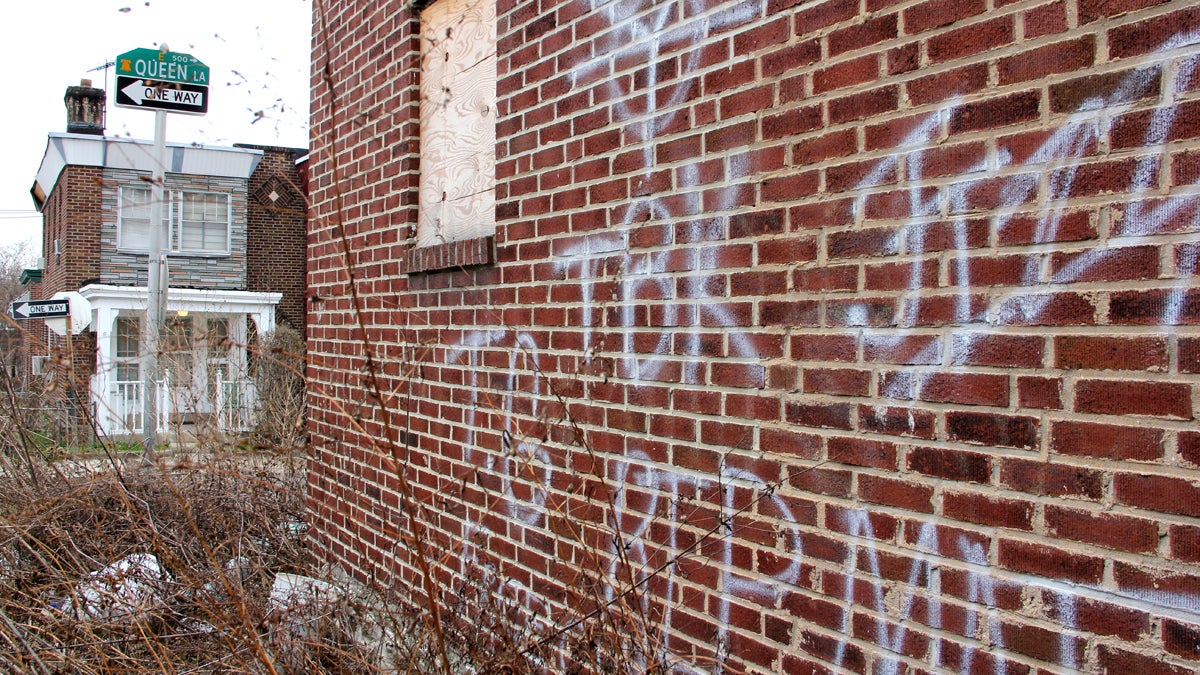Land bank has Philly support, must untangle vacant property system to fix neighborhoods

A vacant home stands tagged by graffiti on Queen Lane at West Clarkson Avenue. (Emma Lee/for NewsWorks)
The signs of Philadelphia’s vacant property epidemic are everywhere. They are in the crumbling facades of half-sealed, long-empty buildings; the urban fabric scarred by the high weeds and trash piles of vacant lots; the increased crime, decreased property values, and sinking community morale. Meanwhile, we watch our schools and public services struggle as so many properties contribute nothing to our tax base, but rather drain scarce taxpayer dollars. All for the modicum of maintenance that is the unacceptable, depressing status quo.
Philadelphia has made noteworthy recent gains, but after decades of losing both population and industry, the city now has over 40,000 vacant properties. Of these, about 25 percent are owned by four different public agencies with four different standards of accountability, four different bureaucracies to navigate, and four different sets of rules governing the process of acquiring property. The result has been a system that is extremely slow to put publicly held properties back into productive re-use — at the current rate it would take the city more than 100 years to dispose of its properties. This inefficiency and unpredictability creates a significant burden on those seeking to develop affordable or market-rate housing, new businesses looking to expand, communities coming together to create a garden, or a homeowner looking for a side-yard.
In recent years a wide range of advocates has been calling for reform of the city’s vacant property system. After looking at best practices employed in other cities and hearing from national experts, momentum has been building to adopt a land bank model in Philadelphia. A land bank is a government agency that would simplify our current tangled bureaucracy by establishing one owner of publicly owned vacant property, one inventory of vacant property, one process to transfer it, one standard of maintenance, and one standard for enforcement. A land bank would also give the city new tools to deal with privately held vacant and tax-delinquent properties. It would provide a way of maximizing scarce public resources to revitalize communities and increase our tax base for schools and city services.
The Philly Land Bank Alliance formed to advocate for the creation of a land bank in Philadelphia and, in March 2013, Councilwoman Maria Quiñones-Sánchez introduced legislation to create a Philadelphia Land Bank. Members of the Alliance represent a broad spectrum of stakeholders, from neighborhood advocates, community development corporations, market rate developers, and advocates for small business, green space and food access. These disparate groups have united around the belief that a predictable, efficient, transparent, accountable, and equitable land bank is an essential part of the significant reforms necessary to place our vacant properties into productive reuse.
These values have resonated with Philadelphians, and hundreds upon hundreds of individuals, nonprofits, and small businesses from across our city have signed on in support of a land bank. We’ve seen that together we can make an impact — that we can create meaningful change to improve our neighborhoods and begin to eradicate blight in every community.
Now, after months of hard work, a national conference, and significant media attention, City Council has scheduled a hearing on the Philadelphia Land Bank Bill for this coming Monday, Oct. 28. We are encouraged to see our elected officials coalescing around the creation of a Land Bank, but, as other municipalities have learned, simply creating an entity called a land bank is no cure all. It must be tailored to fit our local needs while mindful to avoid the pitfalls that other cities have experienced. It needs to be in all ways an improvement on our current system: It needs to be more predictable, more transparent, more equitable, more efficient, and more accountable. It needs to be the land bank that Philadelphia deserves.
The legislation we have today achieves these goals. As the administration and City Council work to negotiate potential amendments, let’s hope the bill we have on Monday does as well.
—
Garrett O’Dwyer is the policy and communications associate for Philadelphia Association of Community Development Corporations.
WHYY is your source for fact-based, in-depth journalism and information. As a nonprofit organization, we rely on financial support from readers like you. Please give today.

